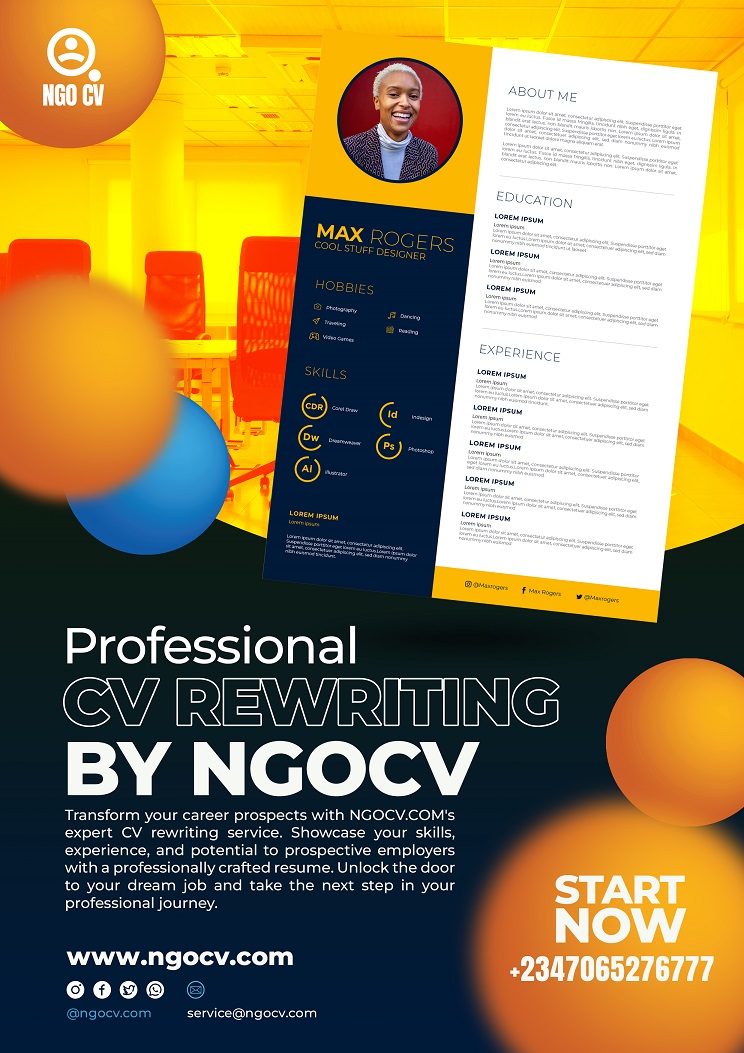The International Rescue Committee (IRC) responds to the world’s worst humanitarian crises and helps people to survive and rebuild their lives. Founded in 1933 at the request of Albert Einstein, the IRC offers lifesaving care and life-changing assistance to refugees forced to flee from war or disaster. At work today in over 40 countries and 22 U.S. cities, we restore safety, dignity and hope to millions who are uprooted and struggling to endure. The IRC leads the way from harm to home.
We are recruiting to fill the position below:
Job Title: Consultant – Conflict Analysis, Northwest
Requisition ID: req41933
Locations: Zamfara, Sokoto and Katsina
Sector: Compliance
Employment Category: Consultant
Employment Type: Part-Time
Open to Expatriates: No
Brief Context of Northwest
- Nigeria’s north-west zonal region covers Jigawa, Kaduna, Kano, Kebbi, Katsina, Sokoto and Zamfara with an estimated population of 50 million people. Since 2014, the region has been faced with a multi-dimensional crisis, rooted in failure of development and long-standing tensions, climate change, youth unemployment, poverty, weak governance, and lack of access to basic services particularly in Katsina, Sokoto, and Zamfara states, driven by the complex set of distinct but interrelated factors.
- Conflict in NW encompasses (but not limited to) farmer-herder clashes, ‘banditry and criminality’, organized armed groups and in late 2019-early 2020, Ansaru (al-Qaeda affiliated group) took credit for two attacks in north-west in 2020. Occasional clashes between farmers and herders competing over increasingly scarce land and water resources have evolved into widespread violence against civilians by armed criminal groups with people suffering from killings, kidnappings, abductions, torture and sexual violence.
Impact of the Insecurity:
- The intensification of insecurity is causing massive displacement and an increasing development and humanitarian crisis in the affected regions especially in Zamfara, Katsina and Sokoto. IRC and its partners will continue to operate in NW however the conflict in NW is dynamic and ever changing and therefore it is important that IRC intentionally get to understand the conflict and its dynamics to better inform its designs and implementation in NW.
- Disrupted livelihoods activities: Armed criminal groups have levied taxes on communities and deprived them from accessing their farmlands, forced people to cultivate for them, and carried out attacks in reprisals or over noncompliance. Communities relying on cattle rearing had their livestock raided or killed. Even with payment of taxes, security is not guaranteed and internally displaced people (IDPs) report that their harvest was destroyed. Insecurity also affects the functioning of markets and trade routes.
- The population is displaced from their homes: More and more farmers are abandoning their homes and farms due to fears of being attacked, because their villages are occupied, or too insecure. The displaced populations are seeking safety in host communities in other villages and towns, other people live in congested informal camps or camp-like settings with poor living conditions and a lack of food, water and shelter. As of December 2021, at least 470,000 people were internally displaced in NW Nigeria across Zamfara, Sokoto, Katsina, Kaduna and Kano states and displacement continues to increase.
- Exacerbated barriers to healthcare and health needs: The disruption of income earning opportunities and displacement combined with the increase of food prices and insecurity has worsened people’s access to health care. Due to insecurity, healthcare workers have also avoided working in rural clinics located in affected areas and delay in accessing healthcare services and treatments. This adds to preexisting challenges of a wide absence of free preventative and curative healthcare and nutrition facilities. Food shortages, poor living conditions and limited ability to access healthcare have also exacerbated health needs, adding to an already fragile situation.
Scope of work
Overall Goal of the Consultancy:
- The main goal of the consultancy is to gain a better understanding of the conflict context and dynamics in Northwest Nigeria and provide evidence that can shape IRCs understanding of the conflict dynamics in Zamfara, Katsina and Sokoto states as well as position IRC to be able to develop proposals and programming that is conflict sensitive based on the principle of ‘Do No Harm’.
- In addition to that the conflict analysis will identify and support in rolling out the required capacity necessary for designing, delivering effective conflict sensitive. programmes in the targeted states and communities, to maximize its positive impact on the current conflict.
Aim of the Consultancy:
- The main aim of the consultancy is to dig into the root causes and comprehensive understanding of the persistent ongoing conflict environment and context in the NW. To identify the key stakeholders involved in the conflict, their interests, and the extent of their influence.To identify dividers and connectors for each type of conflict Assess the impact of the conflict on the population especially the farmers, herders, men, women, youths, boys, girls and marginalized communities etc To identify existing conflict resolution mechanisms, including traditional and formal justice systems, and their effectiveness Provide evidence-based data and information that will inform future programming’s/interventions in NW (Zamfara, Sokoto and Katsina) Provide recommendations on conflict sensitive programming (i.e. how to best mitigate dividers and build on connectors) and the gaps that exist in the 3 states. Provide recommendations on how to effectively promote peacebuilding and conflict transformation in Northwest Nigeria, based on the findings of the conflict analysis. Provide recommendations to IRC and its partners on future programming/ intervention to ensure that the program design and implementation is well informed by the conflict context and dynamics and addresses the root causes of the conflicts and the associated needs (both immediate and long terms)
- The analysis should also examine current IRC’s and partners program activities, how they are being done and its impact on the conflict communities in the 3 states. At the end of the assignments organized a workshop for the IRC northwest and management team to develop a concrete workplan, concretizing on how to implement the recommendations from the Conflict Analysis report for improved conflict sensitivity in each of our current programs and in future programs.The consultancy work will be focused on an in-depth examination of the conflict, its characteristics, causes dynamics and key players the potential impact on IRC’s and its partners programmes on the conflict, and its target groups and potential opportunities for program designs and improved targeting of IRCs current and future programs. This will also include organization capacity assessment and the training needs analysis for design and delivery of a conflict-sensitive programming. The analysis will be carried out in the 3 states in NW Nigeria, Zamfara, Katsina and Sokoto.
Methodology
- IRC Deputy Director for Programs will be responsible for the overall management of the assignment, with the MEAL Coordinator being responsible for the coordination and providing day to day support to the consultancy process and working closely with the consultant. The IRC Senior Technical Advisor for Governance and systems strengthening will provide technical oversight and guidance over the tools and methodology being used for the consultancy and the final report.
- The consultant will carry out the analysis according to the ToR and will include necessary conflict sensitivity tools and exercises to meet study objectives. some of these tools and areas of enquiry include, but are not limited to, the following: (a) secondary literature review/desk research, (b) Key informant interviews, and (C) focus group discussions, (D) observations (e) Data analysis etc. A detailed methodology, including the design of data-collection tools and formulation of specific questions will be developed by the consultant.
Output & Deliverables:
The consultant will be expected to produce the followings:
- Inception report containing a detailed conflict analysis methodology with accompanying workplan and tools to achieve all the objectives that provides an overall conflict analysis its characteristics, causes, dynamics and consequences for women, men, youths, girls, and boys.
- Training workshop for data collectors
- A synthesized report with a focused analysis on the following areas: i) the conflict environment and its interaction with humanitarian and development Programs ii) Gaps in conflict sensitive programing iii) highlight of opportunities for improving conflict sensitive programming.
- Presentation of analysis results and recommendations to IRC SMT, technical Coordinators and NW program team (provide the power point)
- Conduct sensitization on conflict and context analysis, and the importance of the principle of Do No Harm in program design and implementation.
- Develop a workplan for the implementation of the Conflict Analysis report.
Payment Rate and Schedule:
The payment rate will be based on competitive offer and value for money. Meanwhile the payment schedules will be based on deliverables in the contract, set time period or schedule and invoice submission:
- 40% down payment upon signing contract.
- 30% once draft report is produced.
- 30% once the report is finalized.
Qualifications
- The consultancy is open to individuals or team of national and international expert consultants.
With specialist knowledge and research expert in conflict analysis and peacebuilding. The consultants should have the following qualification, skills and experience:
- Minimum undergraduate university degree in conflict studies, Peace building, law, social sciences, or development studies.
- A relevant 5 years of significant background and experience in conflict sensitivity analysis and ethical qualitative research and analysis on conflict issues, causes or approaches to conflict transformation (essential).
- Proven consultant with strong and evident background in conflict analysis and resolutions, peacebuilding, adaptation, and resilience programming.
- experience in conducting context and conflict analysis and development of tools for the integration of Conflict Sensitivity related dynamics into the strategic and operational framework.
- Conflict sensitivity expertise in complex humanitarian contexts, preferably in sub-Saharan Africa
- Knowledge on the history of conflict dynamics in NW will be an advantage.
- Fluent in English, written and oral as well as proficiency in local language from NW Nigeria is an advantage.
- Excellent writing skills and ability to articulate the linkage between findings, analysis, and program recommendations.
- Flexible attitude towards receiving feedback.
Application Closing Date
Not Specified.
Method of Application
Interested and qualified candidates should:
CLICK HERE TO APPLY
Note: The IRC is an Equal Opportunities Employer. The IRC considers all applicants on the basis of merit without regard to race, sex, color, national origin, religion, sexual orientation, age, marital status, veteran status or disability.




